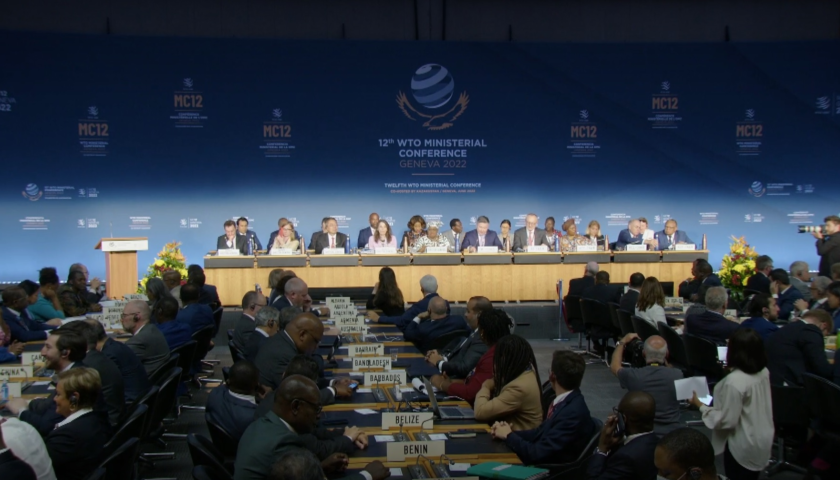World Trade Organisation (WTO), Director-General Dr. Ngozi Okonjo-Iweala has warned that real global Gross Domestic Product (GDP) might fall to as low as five percent if the world economy decouples into self-contained trading blocs.
To avoid such disaster, members were encouraged at the opening session of the 12th WTO Ministerial Conference in Geneva, Switzerland, to demonstrate that the body could deliver for the international community and the people it serves. Okonjo-Iweals pointed out that the world was grappling with uncertainty and crises on multiple fronts.
Delivering her opening speech to the WTO’s 12th Ministerial Conference (MC12), Okonjo-Iweala stressed that over the next few days members would, “have a chance to show the world that the WTO can step up to the plate.”
She said striking agreements in Geneva, “will enhance the ability of all members to respond to people’s aspirations at home — aspirations for food, for health, for security, for better jobs, higher living standards, and a sustainable environment on land, in the oceans, and in our atmosphere.”
While stressing the value of the multilateral trading system as a global public good which over the past 75 years had delivered more prosperity than every international economic order that came before it, Okonjo-Iweala noted that at a time when the multilateral system was seemingly fragile, “This is the time to invest in it, not to retreat; this is the time to summon the much-needed political will to show that the WTO can be part of the solution to the multiple crises of the global commons we face. Now, more than ever, the world needs WTO members to come together and deliver.”
Citing WTO economists’ estimates of real global GDP lowering by about five per cent if the world economy decouples into self-contained trading blocs, Okonjo-Iweala noted the substantial costs for governments and constituents in a scenario where WTO members are unable to deliver results and where they allow, or even embrace, economic and regulatory fragmentation.
“To put this in perspective, the financial crisis of 2008-09 is estimated to have lowered rich countries’ long-run potential output by 3.5 per cent. And the five per cent estimate represents just the start of the economic damage. Additional losses would come from reduced scale economies, transition costs for businesses and workers, disorderly resource allocation, and financial distress,” she stated.

She maintained also that trade decoupling would entrench the development setbacks caused by the COVID-19 pandemic, making it much harder for poor countries to catch up with richer ones.
“This would be a world of diminished opportunities, even greater political anger and social unrest, and intense migratory pressures as people leave in search of better lives elsewhere.”
Okonjo-Iweala urged members to avoid allowing geopolitical tensions to spill over into the work at the WTO as the consequences for the multilateral trading system would be severe. She expressed optimism that, “with the requisite political will, we can tackle the negotiations in front of us, endorse the declarations, and take the decisions that will show the world that the WTO is part of the solution to the world’s pressing problems.”
Various thematic sessions would take place during the Ministerial Conference to respond to ongoing emergencies, particularly the COVID-19 pandemic and the food crisis, she said. Ministers would also have the opportunity to engage in other thematic sessions on fisheries, agriculture, WTO reform, and the e-commerce work programme and moratorium.
However, speaking at the sideline of the conference at WTO-International Trade Centre (ITC) joint event titled “Unlocking Trade for Women’s Empowerment and Sustainable Development”, the former Nigeria minister of finance said WTO members must step up work to ensure that trade and trade rules better serve women amid disruptions posed by multiple crises.
“We need to deepen and diversify supply networks and bring more countries and communities from the economic margins to the mainstream. In this process, which I think of as re-globalization, women have to be at the centre,” DG Okonjo-Iweala said in her opening remarks at the event. She believed that, “Unlocking trade for women’s empowerment and sustainable development is not just the right thing to do. It’s an economic issue. It’s a social issue. It is the key issue,” noting potential increases in global output, wages and employment when the gender divide is addressed.
“A strong and effective WTO is critical for these women, which is one more reason why delivering results at MC12 this week is so important. We want to make sure that people know that the WTO is about people. It’s not only about rules — it’s about rules that help people,” she said.





